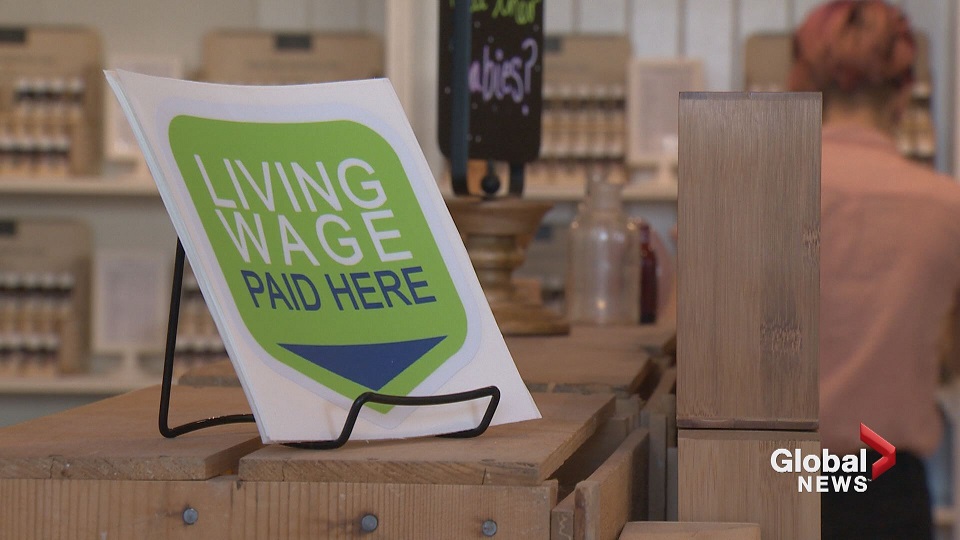A report released Wednesday outlines living wage research for Nova Scotia and New Brunswick, and says minimum pay must be increased within two years.

The Canadian Centre for Policy Alternatives (CCPA) report states current minimum wages in the provinces are “well below living wages in any community.”
According to the report, living wage is calculated as the hourly rate at which a household can meet its basic needs once government benefits have been added and all deductions, such as income tax and employment insurance, are subtracted.
The 2020 annual livable income in Halifax is $21.80 an hour, $3,306 monthly and $39,676 annually.
In Antigonish, it’s $19.55 hourly, $2,965 monthly or $35,581 annually.
In Cape Breton, the living wage is $17.65 hourly, $2,676 monthly and $32,123 annually.
Bridgewater’s living wage was the lowest, calculated at $16.18 hourly, $2,548 monthly and $30,576 annually.
For Saint John, N.B., the 2020 living wage was calculated at $19.55 hourly.
The report says most expenses are higher in Halifax, but the biggest one is shelter cost. Rent in Halifax is on average 31 per cent higher than in Saint John.

The current minimum Nova Scotia wage is $12.55 hourly and it’s $11.70 in New Brunswick.

Get weekly health news
The Canadian Living Wage framework is based on the amount needed for a four member family with two parents working full-time, at 35 hours weekly, to “pay for necessities and provide a cushion above the poverty line.”
The living wage budget includes:
- Food (cost of food without dietary needs, cultural preferences or eating out)
- Clothing and footwear (cost of clothing for a family of four)
- Shelter (rent for a 3-bedroom unit and insurance)
- Transportation (maintaining a used car, public transit pass)
- Child care (full-time child care)
- Health care (basic private healthcare insurance)
- Contingency (small emergency fund)
- Parent education (part-time education for one parent at community college)
- Household expenses (hygiene and cleaning products, kitchen appliances and tools)
- Social inclusion (school supplies, fees, birthday gifts, entertainment, recreation fees)
The report also notes that there aren’t significant changes in the hourly rates needed to meet basic needs of one adult or a single parent with one child.
CCPA Nova Scotia director Christine Saulnier said in a release that government policies have direct impact on our standard of living.
Saulnier said governments need to shift to programs that “ensure universal access, decreasing barriers for everyone to access to pharmacare, dental care, mental health or child care.”
The report says a living wage allows for higher retention rates, fewer sick days and better work quality.
“A living wage is a type of preventative health.”
It also ensures families and individuals can participate in community events that are important to an inclusive society.
The report says parents who live in poverty have talked about their children being excluded from school and community events, even birthday parties.
According to the report, minimum wage should be raised to at least $15 over the next two years in both Nova Scotia and New Brunswick, to bridge the widening gap between an average wage and a livable one.

The CCPA report recommends that governments fund and build a public system of early learning and childcare that is child-centred, play-based, quality and affordable. “We know that these systems can pay for themselves,” the report reads.
All levels of government should fund accessible and affordable transportation, according to the report.
It also stated that governments should build more affordable housing and introduce legislation to control the amount that rent can be increased annually.
In addition, it said governments can fund local food production and distribution, expand public health care and invest with a goal to make post-secondary education free.
The reports says both Nova Scotia and New Brunswick need “a wage-led strategy of inclusive growth to ensure employees receive sufficient income to lead a decent quality of life.”
It also emphasizes that regardless of work status, governments must ensure everyone is able to live as full participating community members.








Comments